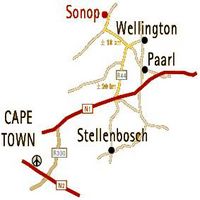TTAB Affirms 2(d) Refusal Of Afrikaans "SONOP" For Wine
The sun has gone down on the attempt of South African winery Savisa to register the Afrikaans word SONOP for wines, distilled spirits, and liqueurs. The Board affirmed a Section 2(d) refusal to register, finding the mark likely to cause confusion with the registered mark SUNRISE, owned by Chilean winemaker Concha y Toro for wine. In re Savisa (Pty) Ltd., Serial No. 78154196 (February 24, 2005) [not citable].

Savisa conceded that SONOP "translates into English as SUNRISE." Since the goods at issue are, in part, legally identical, Savisa had one principal argument: "because SONOP is a word in Afrikaans, an appreciable number of American consumers would not be familiar with the translation of SONOP as SUNRISE.
Savisa submitted an excerpt from TheFreeDictionary.com which, according to Applicant, shows that Afrikaans is "a language spoken by less that 0.1% of Americans." The Board noted, however, that the excerpt actually shows "percentages of 'Primary Language at Home.'" This is not that same as the "percentages of Americans who know a particular language." The Board noted that, other than Spanish, no other language reached the level of 1% -- not even Italian (0.384%), which is "a common, major language in the world and is spoken by many people in the United States."
The Examining Attorney submitted a report from the USPTO Translator for, inter alia, Afrikaans, which indicated that:
"Afrikaans is a well-established language, recognized by all of the advanced and developed nations, and is a form of old Dutch. It 'is a European language, and that is why it is familiar in the USA.' It is also one of the principal Germanic languages, spoken by more than 20 million people."
The Board noted that Afrikaans is one of the official languages of South Africa, that it is taught in South African schools, and that all road signs in South Africa are in Afrikaans and in English. The Board concluded that Afrikaans is not an obscure language: it is "a modern language of a very large country, as well as a major language of five other countries."
"People from the Republic of South Africa are likely to emigrate to or visit the United States, and obviously the English-speaking people from that country would not encounter a language barrier here. *** Because of the diversity of the population of the United States, coupled with temporary visitors, all of whom are part of the United States marketplace, commerce in the United States utilizes innumerable foreign languages."
The Board therefore ruled that the doctrine of foreign equivalents applies here, and that the marks at issue should be considered to have the same meaning. The Board's DuPont analysis led inevitably to its conclusion that confusion is likely.

Applicant Savisa apparently bottles its wine in the vicinity of Sonop, South Africa. Would it have made a difference here if Applicant had argued that SONOP would be recognized by Afrikaans-speaking people as the name of a town or geographical area, rather than as the Afrikaans word for SUNRISE?
Postscript: Compare the TTAB's treatment of SONOP with the CAFC's recent discussion of the French word "veuve" in Palm Bay Imports, Inc. v. Veuve Clicquot Ponsardin Maison Fondee En 1772, 73 USPQ2d 1689 (Fed. Cir. 2005), discussed here at the TTABlog. In Palm Bay, the CAFC ruled that the doctrine of foreign equivalents should be applied only when the "ordinary American purchaser would 'stop and translate [the word] into its English equivalent.'" It then held that the record evidence did not support the Board's finding that the ordinary consumer would translate "veuve" into the English "widow." Where is the evidentiary support for the TTAB's conclusion that the "ordinary American purchaser" would stop and translate the Afrikaan "sonop" into "sunrise?"
Text ©John L. Welch 2005. All Rights Reserved.




0 Comments:
Post a Comment
<< Home